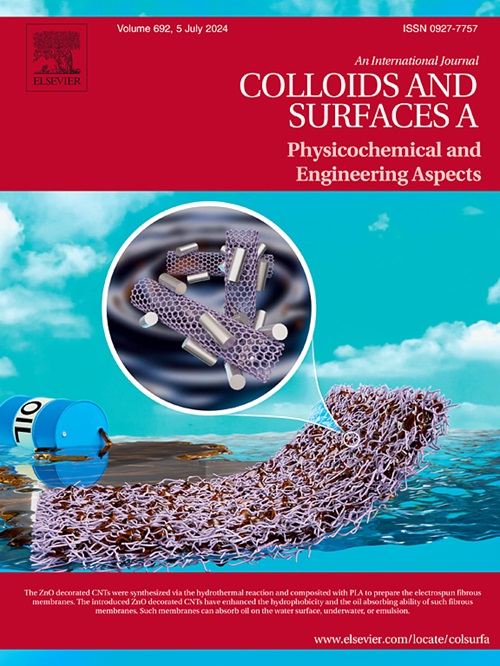Inhibitive property and mechanism of polyvinyl alcohol/tannic acid materials on clay hydration and swelling
IF 4.9
2区 化学
Q2 CHEMISTRY, PHYSICAL
Colloids and Surfaces A: Physicochemical and Engineering Aspects
Pub Date : 2025-02-10
DOI:10.1016/j.colsurfa.2025.136383
引用次数: 0
Abstract
Shale composed of a large amount of clay minerals is easy to swell and disperse in water, leading to wellbore instability. In recent years, adhesive shale stabilization materials have become a research hotspot because of their good bonding effect. However, many existing materials have problems such as high cost and incompatibility. In this study, polyvinyl alcohol (PVA) and tannic acid (TA) have been used as raw materials to prepare a bonding-type shale stabilizer (abbreviated as PT) for water-based drilling fluids. The shale compressive strength tests, immersion tests, linear swelling tests, and shale hot-rolling recovery tests have been used to evaluate its inhibitive performance. The results showed that the shale recovery of 3 % PT solution with a PVA/TA mass ratio of 2:1 can reach more than 90.0 %, even after hot-rolled at 150°C. In addition, the bentonite soaked in PT aqueous solution had good integrity and small volume expansion at 90°C. After immersing for 5 h, the swelling height of the bentonite sample is only 2.0 mm. Meanwhile, the compressive strength of the artificial core after soaking in 3 % PT aqueous solution at 90°C for 24 h was the highest, reaching 30.19 MPa. The rheological and filtration performance evaluation showed that PT could improve the viscosity and reduce the fluid loss of bentonite dispersion, displaying good compatibility. According to microstructure analysis, it was preferred that PVA polymer with a large number of hydroxyl groups and TA small molecules containing catechol structures in PT could form a network structure through multiple hydrogen bonding interactions, showing a strong adhesive effect. Then, PT easily adsorbed on the surface of shale or clay particles, formed a dense adsorption film on the surface to block the invasion of water molecules, and even enhanced the cementation between these particles. Finally, hydration, swelling, and dispersion of clay minerals were well inhibited, and the borewell stability was enhanced.
求助全文
约1分钟内获得全文
求助全文
来源期刊
CiteScore
8.70
自引率
9.60%
发文量
2421
审稿时长
56 days
期刊介绍:
Colloids and Surfaces A: Physicochemical and Engineering Aspects is an international journal devoted to the science underlying applications of colloids and interfacial phenomena.
The journal aims at publishing high quality research papers featuring new materials or new insights into the role of colloid and interface science in (for example) food, energy, minerals processing, pharmaceuticals or the environment.

 求助内容:
求助内容: 应助结果提醒方式:
应助结果提醒方式:


